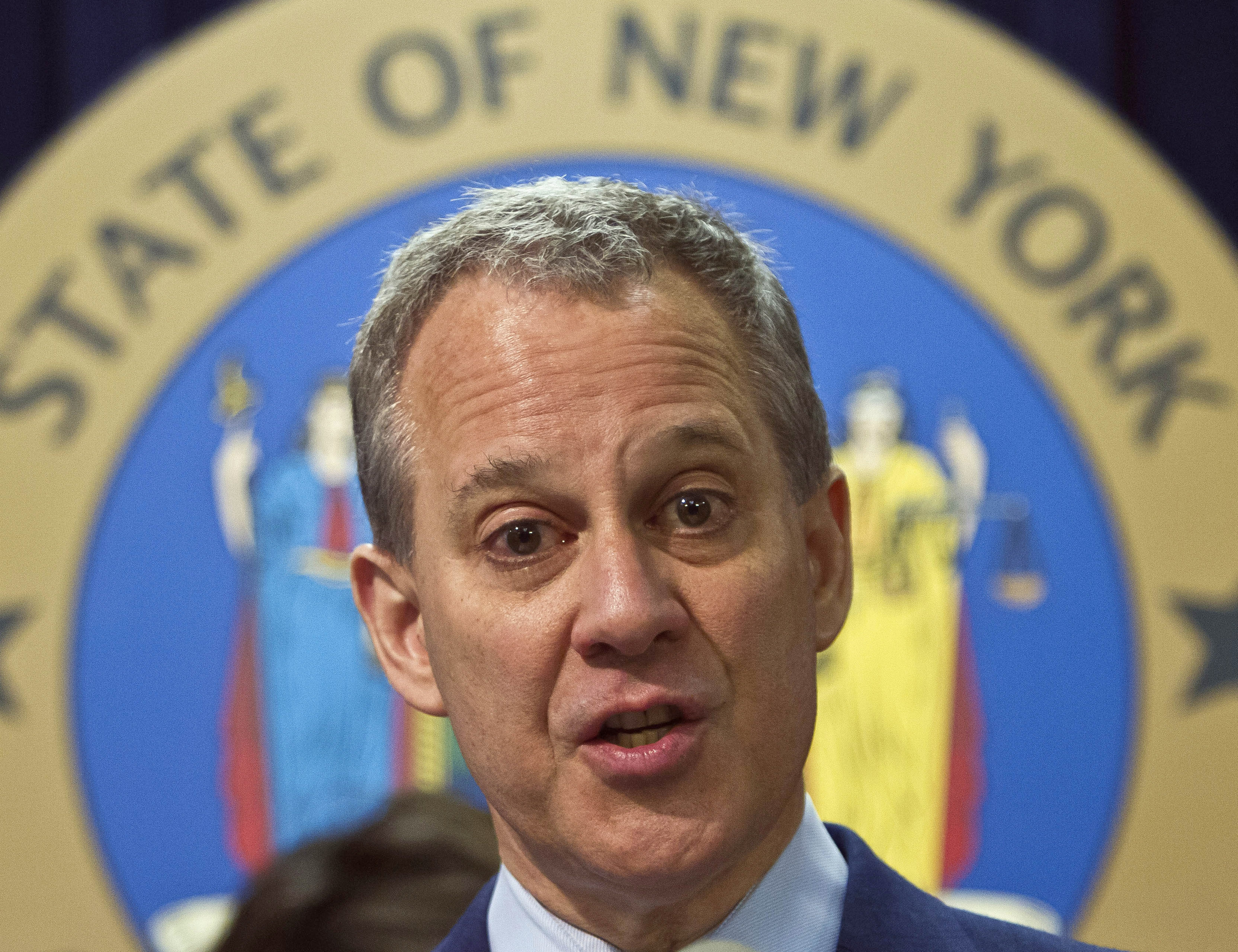New York’s chief law enforcement officer suddenly resigned on Monday night after multiple women accused him of verbally and physically abusing them. New York Attorney General Eric Schneiderman, a fast-rising Democrat with national ambitions who had positioned himself as a champion of women in the #MeToo era, initially attempted to dismiss the accusations against him as “role-playing and other consensual sexual activity.” But he swiftly announced his resignation after New York Gov. Andrew Cuomo, a fellow Democrat, called on him to step down.
“I do not believe it is possible for Eric Schneiderman to continue to serve as attorney general, and for the good of the office, he should resign,” Cuomo said in a statement. That came only minutes after The New Yorker published a bombshell report that detailed the direct accounts of four women who accused Schneiderman of abuse going back to 2013. Less than an hour later, the attorney general tendered his resignation.
Multiple women who were former romantic partners of Schneiderman accused him of slapping and choking them in intimate situations without consent and then threatening them with death if they told anyone, according to a harrowing report by The New Yorker’s Jane Mayer and Ronan Farrow.
“No one is above the law, including New York’s top legal officer,” Cuomo continued in his statement. “I will be asking an appropriate New York District Attorney to commence an immediate investigation, and proceed as the facts merit.”
The call was echoed by the president of the New York chapter of the National Organization for Women — which had endorsed Schneiderman in both his 2010 and 2014 election campaigns — along with Sen. Kirsten Gillibrand, D-N.Y., a political leader of the #MeToo movement and until this week a Schneiderman ally.
Moments later, Schneiderman released a short statement, his second of the night, announcing that Tuesday would be his last day in office.“It’s been my great honor and privilege to serve as attorney general for the people of the State of New York,” this statement read in part. “In the last several hours, serious allegations, which I strongly contest, have been made against me.”
While Schneiderman acknowledged that the allegations had rendered him ineffective as attorney general, he continued to deny their substance. In an earlier statement, he had described the incidents described in the New Yorker article as “role-playing” that had occurred “in the privacy of intimate relationships.”
“I have not assaulted anyone. I have never engaged in non-consensual sex, which is a line I would not cross,” Schneiderman, who was up for re-election this year (and was widely expected to win), had said earlier on Monday.
To state what ought to be obvious, there is a world of difference between consensual kinky sex or BDSM role-playing, such as Schneiderman appears to describe, and nonconsensual violence or abuse, as alleged by all four women mentioned in The New Yorker article.
As reporter Jane Mayer explained to MSNBC on Monday night, all four women “felt tremendously conflicted” after Schneiderman sued disgraced Hollywood mogul Harvey Weinstein for his apparent pattern of “unrelenting” sexual harassment, intimidation and discrimination. “The hypocrisy became kind of untenable and they began to reach out to each other and form an alliance,” Mayer explained.
While two of Schneiderman’s former partners are unnamed in the report, two women went on the record and provided medical evidence and contemporaneous corroborating accounts from high-profile friends, including novelist Salman Rushdie.
“Sometimes, he’d tell me to call him Master, and he’d slap me until I did,” said Tanya Selvaratnam, an immigrant from Sri Lanka who dated Schneiderman after meeting him at the Democratic National Convention in 2016. “[H]e started calling me his ‘brown slave’ and demanding that I repeat that I was ‘his property.’”
Selvaratnam also alleged that Schneiderman threatened to tap her phone, among other threats.
Michelle Manning Barish, another former partner of Schneiderman’s, provided the most detailed account, describing how the high-profile Democrat hit and choked her repeatedly, often after excessive drinking.
“All of a sudden, he just slapped me, open-handed and with great force, across the face, landing the blow directly onto my ear,” she said. “It was horrendous. It just came out of nowhere. My ear was ringing. I lost my balance and fell backward onto the bed. I sprang up, but at this point there was very little room between the bed and him. I got up to try to shove him back, or take a swing, and he pushed me back down. He then used his body weight to hold me down, and he began to choke me. The choking was very hard. It was really bad.”
During his first year in office as attorney general, Schneiderman was instrumental in passing a law making strangulation, common in domestic abuse cases, a serious violent crime.
Schneiderman, who was among several Democratic state attorneys general leading a de facto movement of legal resistance against President Donald Trump, sued the administration over the Muslim ban and reproductive rights issues. He also successfully sued Trump University. The president will undoubtedly celebrate Schneiderman’s stunning and sudden demise. In a 2013 tweet, Trump predicted as much, comparing Schneiderman to former congressman Anthony Weiner and former state Attorney General Eliot Spitzer, a pair of New York Democrats with national political ambitions who were brought down by sex scandals — respectively, sexting with a minor and solicitation of prostitutes.
Weiner is gone, Spitzer is gone – next will be lightweight A.G. Eric Schneiderman. Is he a crook? Wait and see, worse than Spitzer or Weiner
— Donald J. Trump (@realDonaldTrump) September 11, 2013
The New York state legislature will appoint Schneiderman’s successor, and that could be exciting. Although the state has reliably voted Democratic in recent years, control of the legislature remains split, with Republicans holding a one-vote majority in the state Senate, thanks to a single renegade Democrat who caucuses with the GOP.
#TimesUp Hollywood
As more women get power in Hollywood, will the industry’s gender politics finally change?


